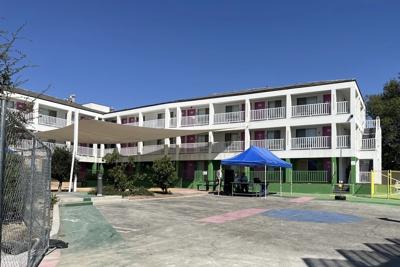
This article was originally published by LAist on Aug 25, 2025.
The L.A. region’s homeless services agency has been crafting a message for family services providers on how to deliver bad news to families experiencing homelessness: Due to funding cuts, they’re out of housing.
Programs to help families move into permanent housing also have been cut.
In a draft memo from July obtained by LAist, the Los Angeles Homeless Services Authority has been working with providers on language to share with families seeking assistance: Shelters are full. They're out of housing.
“Due to current funding limitations in LA County’s Family Coordinated Entry System, we are unable to enroll new families in Interim housing (shelter or motel vouchers), housing navigation, or rental subsidy programs,” a proposed message reads. “We apologize for the inconvenience and will provide updates as they become available.”
LAHSA confirmed it’s working on such a memo and that decreases in state funding have limited options for families experiencing homelessness.
“While the family interim housing system operates at capacity, LAHSA is dedicated to ensuring every available resource is used to help families experiencing homelessness,” a LAHSA spokesperson said in a statement. “To aid that effort, we are working with both the City and the County to draft a memo that supports providers as they guide families requesting assistance to other programs that can help them attain the assistance they require.”
Those programs include DPSS, 211, and faith-based organizations, LAHSA said. The organization said it couldn't comment further on the language of draft memos, as "they are always subject to change.
The move comes as the number of people in unsheltered families with children has been on the rise, according to official estimates.
Service providers are contracted out by LAHSA to run "Family Solutions Centers" and to help families, among other services, in a two-step process:
- First, move unsheltered families into temporary shelter, known as “interim housing” (short term, like motels).
- Second, move those families from temporary shelter into permanent living situations.
Now, providers are in the position of telling new families they can’t help with either step because they’re full.
As of Aug. 8, the county had nearly 17,500 households in interim housing sites, though it’s unclear how many of those were families with children. Earlier this year, there were 2,661 families with children in shelters, according to the point-in-time count.
Family housing: A money and space problem
LAHSA’s budget for the fiscal year that started in July was $836 million, compared to $875 million the year before. The agency recently notified staff of potential layoffs, but the vast majority of its budget gets contracted out to homeless services providers throughout the region.
The recent cuts include a 71% reduction in state funds that have been a key source of funding, specifically for families experiencing homelessness. State funding overall for the agency declined from $145.4 million last year to $88.3 million as money that was available throughout the pandemic has sunsetted. Funding from the city, county and federal government all have also been reduced, as governments have faced financial headwinds.
“The reduction of state funding sources like HHAP and CalWORKS HSP has led to a decrease in available assistance through programs like time limited subsidies (TLS) for families experiencing homelessness,” LAHSA said in a statement.
But even with funding, providers have had to contend with specific challenges in serving families. Motels also have occupancy limits, which makes it harder for larger families to stay together. There’s also a lack of affordable housing for families, who need larger units.
“The infrastructure that we have been creating to combat homelessness is really geared and designed toward helping … single individuals or couples but not for families with children,” said Constanza Pachon, CEO of The Whole Child, which provides services in Southeast L.A. County.
‘We’re starting to feel the crisis in our lobbies’
Pachon and other homelessness service providers LAist spoke to said financial challenges are converging onto the system simultaneously, even as voters passed a new sales tax last year to raise revenue for homelessness and affordable housing.
"We're starting to feel the crisis in our lobbies. We're starting to see families coming for resources that we used to have,” said Stephanie Klasky-Gamer, president and CEO of LA Family Housing.
Without funding for more motel vouchers and temporary shelters being full, she said their agency has had to refer families to safe parking sites instead. There are 16 sites countywide through LAHSA’s Safe Parking program.
Earlier this year, providers were also told to pause enrolling new families for a temporary rental subsidy program, called time-limited subsidies, which helps families move out of shelters. The program is trying to ramp down from 7,500 slots to 2,500 slots by next year.
Klasky-Gamer said LA Family Housing currently supports 360 families with that rental assistance, but next year, it will only be able to serve 54 families.
“ It's a really scary time because … without those subsidies, we don't know if all of our families will be able to stay in their housing,” she said. ”I fear we will see more people experiencing street homelessness in the coming years with the loss of these resources.”
Without the ability to move people into permanent housing, she said people will stay in shelters longer.
“It's really created a perfect storm of challenges for folks who are doing this work,” said Ryan Smith, CEO of the St. Joseph Center, a homelessness service provider in West L.A.
Smith explained that while the passage of Measure A last fall is set to bring in more revenue than its predecessor, Measure H, the money is being allocated to more than just homeless services — like affordable housing development. At the same time, there’s been a loss in other funding streams. He said there have been "tectonic shifts” in the funding landscape — and that doesn’t even consider further loss in funding from anticipated federal funding cuts.
Pachon, with The Whole Child, said her agency had a growing waitlist for families who need housing. She said the agency still provides counseling and referrals but has had to develop its own messaging in the meantime about the unavailability of housing resources.
”Unfortunately, we have to tell them that we are at capacity and we cannot take them in,” she said. “It's heartbreaking, but it's unfortunately what we have to do.”











(0) comments
Welcome to the discussion.
Log In
Keep it Clean. Please avoid obscene, vulgar, lewd, racist or sexually-oriented language.
PLEASE TURN OFF YOUR CAPS LOCK.
Don't Threaten. Threats of harming another person will not be tolerated.
Be Truthful. Don't knowingly lie about anyone or anything.
Be Nice. No racism, sexism or any sort of -ism that is degrading to another person.
Be Proactive. Use the 'Report' link on each comment to let us know of abusive posts.
Share with Us. We'd love to hear eyewitness accounts, the history behind an article.